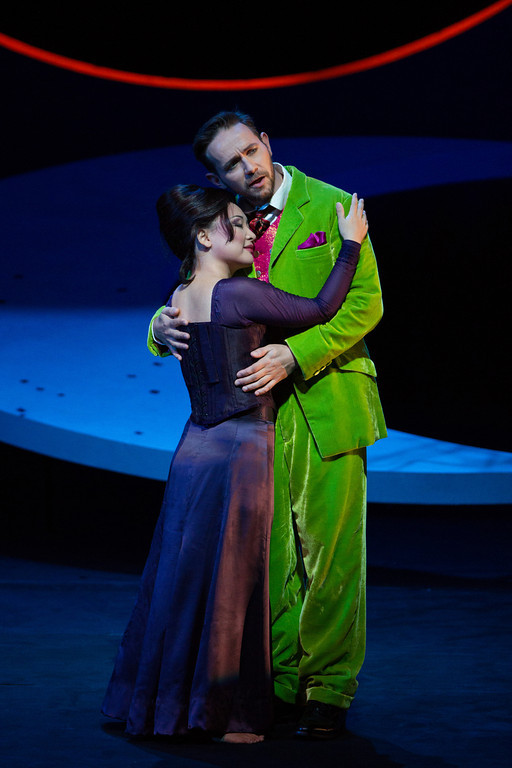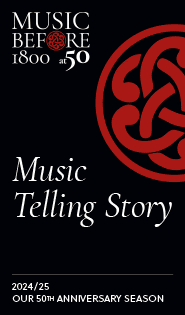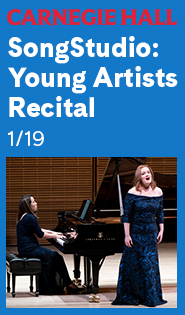Met’s captivating “Midsummer Night’s Dream” finds Britten’s magical mix

Kathleen Kim as Tytania and Iestyn Davies as Oberon in Britten’s “A Midsummer Night’s Dream” at the Metropolitan Opera. Photo: Marty Sohl
Benjamin Britten’s A Midsummer Night’s Dream premiered at the Metropolitan Opera in 1996, a hefty 36 years after its completion. Given Britten’s significant historical presence at the Metropolitan Opera and in New York City at large, it’s a strange fact considering the work became relatively present in the repertory early on. Whatever the case, the original Met Opera production by Tim Albery is currently being revived to mark the Britten centennial year.
Shakespeare’s whimsical play has inspired numerous composers of opera, absolute music, and otherwise, but Britten’s attempt is one of the few to have lasted and entered a general public awareness. Britten and his partner Peter Pears took Shakespeare’s words exactly (though cutting the play approximately in half) and set them to music that is, in a word, otherworldly. From the opening sounds, the listener knows that they have entered territory that could have only been created by the masterful Britten. Preparing the audience, the opening music encompasses muted strings that slide their way lugubriously through major chords. It’s unforgettable and transporting, as we are suddenly lifted into a sleepy fairy world.
WIth James Conlon, a Met regular and eminent Britten interpreter as their skillful guide, the Met orchestra sounded transparent and ethereal. The musicians easily transitioned from these watery soundscapes to the more classically romantic music of the human lovers, and the tricky rhythmic sections with Puck.
Shakespeare’s play incorporates three distinct realms – that of the humans, the fairies, and the “rustics,” who put on the play. The fairy world takes place in the upper registers, with a chorus of boy sopranos, a coloratura soprano as the queen Tytania, and a countertenor as Oberon, king of the fairies. Iestyn Davies appears as Oberon and Kathleen Kim as Tytania. Britten’s language for the children’s chorus is easily some of his most beautiful in the opera – it is simple and melodic, but still eerie and rhythmic. The children here handled it with apparent ease and sounded magnificent.
It’s clear why Iestyn Davies has become one of the premier countertenors – his sound maintains a richness and warmth that is often missing in the countertenor voice. Oberon’s music frequently stays low in the countertenor’s range, and is not some of the more interesting music in the work, but Oberon’s opening aria “Well go thy way” is a gorgeous exposition for the singer, and Davies commanded the audience with his presence and vocal nuance. Kathleen Kim’s feathery and easy coloratura singing in the role of his fairy queen was a perfect pairing.
Puck, a speaking role, is portrayed impishly by Riley Costello in his Met debut. A Broadway actor, the timbre of Costello’s voice lends just the right amount of boyish and mischievous charm. Crossing the world boundaries, Puck sends everything into disorder by administering a love potion to Lysander instead of Demetrius, and causing the humans’ love connections to cross.
As the male half of the quartet of young lovers, tenor Joseph Kaiser plays Lysander and baritone Michael Todd Simpson portrays Demetrius, both of whom are magically forced to fall in love with Helena. Mezzo-soprano Elizabeth DeShong is Hermia, scorned by both, and soprano Erin Wall is Helena. Kaiser had some vocal trouble in the upper part of his range, particularly in the “Amen” section at the end of “Fair love, you faint with wand’ring in the wood,” but DeShong, as the forgotten love Hermia, was of particular note for her flexible, incredibly rich mezzo voice.
But the standout performances belong to the rustics, particularly Matthew Rose as Bottom and Barry Banks as Flute. The comedic role of Bottom, and the group of men as whole, verge on the ridiculous at times in terms of their physical comedy, but if anyone was bothered, surely Rose’s gorgeous bass voice would have more than made up for it. Rose never languishes in his sound however, as when Puck transforms him into an ass, he deftly infuses his voice with the occasional screeching and braying sounds and just the right amount of physical acting. In the final scene where the men put on their play for the royals, Flute and Bottom opposite each other as star-crossed lovers is a comic highlight.
The sets, as designed by Antony McDonald, call to mind a stylized children’s production. A crudely painted outline of a stage and two-dimensional brightly lit backgrounds work remarkably well in a hazy Alice in Wonderland kind of way. The costumes too are utterly fantastical – the rustics in their loud suits, the fairies in bright colors and largely accentuated wings and accessories. The staging is modern dress, and yet the flatness of it all almost feels similar to how a Shakespeare play would have looked and been performed in Elizabethan times.
As Puck gives the audience his final word, he floats to the top of the stage, hanging from very visible wires in the production’s last stylized gesture. It all works though, and is just enough to be magical and gorgeous to look at without ever detracting from the singers.
A Midsummer Night’s Dream runs through October 31. metoperafamily.org; 202-362-6000.


Posted Oct 13, 2013 at 12:38 pm by monika bialas
How could you have used anyone else but the expert Benjamin Britten interpreter, Maestro James Conlon, who has been at home at the MET for 40 years? Congratulations, Maestro. Another great and memorable performance! Thanks to all who participated in paying homage to Shakespeare and Britten’s Midsummer Night’s Dream.
Posted Oct 29, 2013 at 4:35 pm by CastaDiva
What a wonderful, wonderful performance! Talented, appealing singers, an enchanting children’s chorus, magical sets, and most of all, that gorgeous score, beautifully played by the Met orchestra under Maestro Conlon’s baton. Enjoyable and memorable.